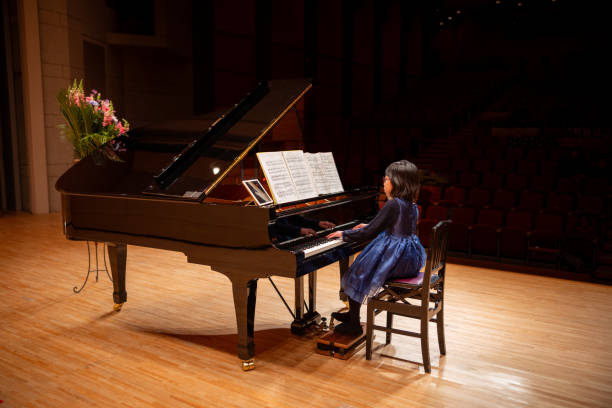At fifteen, Svetlana Andreeva stepped from behind a velvet curtain, her dark skin stark against a plain black dress, her white cane tapping lightly—a symbol of her blindness, but also her deep sensitivity to the world.
Unknown in classical circles, she approached a gleaming Steinway grand piano, its polished surface catching her reflection.
Suddenly, the silence broke. Boris Smirnov, a revered figure in classical music, sneered from backstage.
“Get her off—she’ll ruin the piano,” he scoffed, icy eyes fixed on Svetlana.
“Blind! Who let a blind nobody near my $150,000 Steinway? This isn’t charity.”
Laughter rippled from the wings. Some coughed awkwardly; others looked away. No one defended her.
Yet Svetlana didn’t flinch. She stood tall, her cane firm in her grasp, and walked to the piano with quiet resolve.
Ignoring the backlash, she sat, sensing the tension like a current in the air. Smirnov yelled again, but she did not stop.

Her fingers, once fumbling on battered orphanage keys, now rested gently on the piano. She struck the first note—not loud, but tender, cutting through the judgment like a beam of light. The crowd hushed.
What followed wasn’t just music; it was a language of shadows and resilience, shaped by hardship and silence.
At thirteen, blind since birth and orphaned at three, Svetlana had arrived at Eastbrook Conservatory in Hartford.
The school, elite and rigid, welcomed diplomats’ children, not blind orphans. She was part of a “Silent Observer” program, which excluded her from classes, rehearsals, and even instrument access. She was invisible, more shadow than student.
Still, she listened. She sat outside the lecture rooms, absorbing harmonic theory through the walls.

She tracked rhythm by counting footsteps and memorized melodies in her mind. Alone in her room, she’d trace musical phrases on her thigh, re-creating what she’d heard.
The indifference was brutal. No greetings, no kindness.
When she wandered into a rehearsal room once, a student mocked, “Since when does the school allow pets?”
Laughter followed. Even the dorm manager warned her not to make others “uncomfortable.”
But instead of giving up, she listened harder. She noticed how vibrations differed between floors, how the worn floorboards subtly kept time.
She composed pieces in her head, with no instruments or instruction.
One day, Professor Igor Petrov, a retired music teacher, saw her outside his classroom, miming a fugue in the air. Touched by her devotion, he invited her to play.
From then on, they met in a dusty storage room with an old piano. He didn’t teach scales or theory—he told stories.

“A fugue is a soul chasing itself,” he’d say. She learned by feeling vibrations and interpreting moods.
“D minor isn’t sad. It’s the shadow light leaves behind,” he explained. Svetlana understood music deeply—not academically, but emotionally.
As her talent bloomed, whispers spread.
The head of piano, Andrei Moskovich, disapproved. “This school isn’t a place for sentimental experiments,” he warned Petrov.
But Petrov, seeing how gifted Svetlana was, secretly recorded an improvised piece and submitted it for Eastbrook’s annual audition. Her performance was raw and unrefined—but honest.
She was given a slot, not in the main hall, but at dawn, in a back rehearsal room with an old upright piano—clearly a formality, not a real opportunity.

Still, she arrived early, dressed plainly. Petrov walked her there and whispered, “It’s not about whether they choose you. It’s about whether you still need them.”
In the room, she performed Rachmaninoff with intensity, not for applause, but for truth. The judge nodded curtly and left.
Unbeknownst to her, the school janitor recorded the performance and uploaded it, titling it “Blind Girl Rejected by Conservatory Plays Rachmaninoff by Heart.”
At first, the video sat unnoticed. Then a famous pianist reposted it: “I haven’t cried from music in ten years.”
A deaf artist commented, “I felt her playing through the speakers.”
Soon, millions watched. The world noticed what Eastbrook had rejected.

Back at the school, Moskovich brushed it off.
But then a message came from the International Music Institute: “We want Svetlana Andreeva to open the World Harmony Gala.” Moskovich had no choice but to accept.
Svetlana, now sharing a home with aging Petrov, received the invitation in Braille.
“You’ll be heard,” he said, handing her a modest black dress. “It doesn’t need to shine—it only needs the right sound.”
At New York’s Crescendo Hall, during the gala’s rehearsal, she sat barefoot at the grand piano—her way of feeling connected to the stage.
Smirnov, slated to perform after her, was furious. “She plays first? I won’t follow a blind amateur!” The director calmly replied, “Then don’t. But she will.”
That evening, Svetlana walked onto the grand stage, her cane tapping softly, the audience silent. No orchestra. No spotlight.

Just her, a piano, and a small wooden flute—her mother’s keepsake. She began with her own composition: a sorrowful G note, then fragile chords—some dissonant, some hopeful.
Her left hand expressed struggle; her right, searching. It wasn’t polished, but it was real.
Halfway through, she paused, picked up her flute, and played a haunting melody—something like a lullaby, something lost and found again.
It wasn’t performance; it was testimony. Even Smirnov stood still backstage, shaken not by technical mastery, but by the raw, unfiltered truth he had long buried.
When she finished, no applause came at first. Just silence. Then, slowly, the hall erupted.

Svetlana didn’t smile, didn’t bow. She simply stood, picked up her flute and cane, and walked offstage, leaving behind not just music, but a revolution. The world hadn’t just heard her—they had finally listened.